Fear, deception, hatred, and forgiveness
Civil rights leader Howard Thurman's 1949 treatise prods our conscience
As I was reading Howard Thurman’s classic 1949 treatise Jesus and the Disinherited this week, I was struck by how his voice pierces even seventy years later. Although I had bought it in the used section of the Harvard Book Store months ago (what a find!) expecting choice words favoring the poor over the oppressed, Thurman isn’t interested in easy us vs. them harangues.
Perhaps it’s a sign of our polarized times that I was so ready for a screed lambasting the rich and the powerful, or perhaps it’s just a sign of my corrupted heart. Thurman, who served as a mentor to many leaders of the civil rights movement, is certainly clear-eyed about the unjust structures that leave certain groups dehumanized and destitute, but in this book he asks a different question: What does Jesus’ life and example actually offer to those who have been boxed in?
While I deliberately avoid drawing any parallels here to the tragedies unfolding in Israel and Gaza because there are no perfect comparisons, Thurman’s words accompanied me as I processed the conflict, violence, rage, retaliation, grief, and bleak hopelessness of the past week. More than that, though, they convicted me of the seeds of bitterness and resentment that I allow to germinate within my own heart - however justified that they may seem - that lead me to devalue others.
I hope that his words will bring comfort in their affirmation of human dignity, and also challenge you to deeper empathy and forgiveness.
The state of the world
Thurman is adamant that the arrangements of power in this world are very wrong. In his day, the situation at the forefront was segregation in the U.S., but he also draws attention to other unequal structures such as the caste system in India or the colonization of Korea by Japan. What I find interesting, though, is that he doesn’t let underlying injustice color our moral equations.
In a world of the strong and the weak, the twisted relationships that govern life become normalized, and what’s normalized becomes seen as right…or even righteous.
In this state of affairs, three main “hounds of hell” pursue the disinherited: fear, deception, and hatred. While these attitudes seem justified given the unfairness of the world, Thurman pushes us to examine the corrosive influence of each of these in turn, and shows how Jesus offers an alternative path that still honors the humanity in each person.
Fear
Victims of systemic discrimination live under the threat of violence, to which they have no recourse. They suffer constant reminders of their vulnerability and inferiority.
Thurman writes, “Under such circumstances, there is but a step from being despised to despising oneself.”
It is natural for the weak to fear the strong. Yet fear also mediates the attitude of the strong towards the weak, for it is because of fear that the strong desperately keep the weak in their place - and feel warranted in their actions.
Although the weak’s fear of the strong is a logical defense mechanism, Thurman deems it “death for the self,” because to fear a man is to place him in a place of pre-eminence that should belong to God alone. Thurman contends that “the core of the analysis of Jesus is that man is a child of God,” and this knowledge of identity and belonging in God gives humans a “new courage, fearlessness, and power.”
This profound sense of self-worth and personal dignity is not enough to rectify the injustices the strong perpetuate over the weak, “but without it, nothing else is of value.” Thurman sees Jesus’ affirmation of each person’s dignity as a foundational assurance that makes the human spirit unconquerable even under threat of violence.
Deception
Deception is a longstanding strategy by which the weak protect themselves against the strong. We cheer in stories when the underdog outwits the villain even by means of subterfuge, and why wouldn’t we?
While Thurman understands why the disinherited turn to deception (how can there be honesty where there is no real community?), he counsels that practicing deceit numbs our sense of morality.
Instead, he boldly asks each person to live with “a complete and devastating sincerity,” for sincerity and genuineness in human-to-human interactions is commensurate to being genuine in one’s interaction with God. Acknowledging that sincerity is no defense mechanism against the powerful, Thurman nevertheless argues that faced with the genuine sincerity of the disinherited, the strong will be caught off guard:
“Instead of a relationship between the weak and the strong there is merely a relationship between human beings. A man is a man, no more, no less. The awareness of this fact marks the supreme moment of human dignity.”
The cynical side of me finds this awfully hopeful, for wouldn’t the dominant just crush the weak in this scenario? Yet Thurman writes not about what frees the dispossessed from the yoke of human oppression, but from the internal rot of moral dissolution.
Hatred
Hate, resentment, and bitterness are more than understandable for a people that faced centuries of enslavement, torture, rape, and kidnapping followed by a false freedom that still kept them bound by unjust laws.
Yet even in 1949, Thurman counsels that “hatred destroys finally the core of life of the hater. …Hatred bears deadly and bitter fruit. …The logic of the development of hatred is death to the spirit and disintegration of ethical and moral values.”
A radical option
What options, then, are the dispossessed left with? If not to live in fear, deception, and hatred - which will erode their very humanity - how then should they proceed?
Both in Thurman’s time and in today’s culture, many would agree that the disinherited are warranted in scrabbling in whatever ways they can to get what they can for themselves and their families and to get back at the powerful. So what if they use deceit or violence - it’s no worse than what’s been done to them for decades.
Rather than accept the prevailing logic of the times, Thurman points to the example of Jesus inviting Matthew to become part of his tightest-knit group of followers. Matthew, a tax collector, was despised by his fellow Jews for robbing them in service of the Romans. Tax collectors were wealthy off the backs of their compatriots: they were easy to hate, and roundly condemned. Yet Jesus extends a hand of friendship and forgiveness. He acknowledges in Matthew a common humanity and an intrinsic worthiness.
I can hear the murmurs:
Wait, Jesus, surely you don’t mean him? Don’t you know what he’s done? How he’s ruined my family? How he lives in comfort while we suffer? How he’s betrayed his own people to ingratiate himself to our persecutors while skimming off the top for himself?
But Jesus sees Matthew’s soul with a kindness and clarity that no one else can.
To awaken the tax collector (or any oppressor) to their identity as a child of God, we have to first ourselves recognize them as such. Thurman argues this is the only way out of the violent stalemate and calcified dynamics of weak versus strong. Most challenging is the impossible task of forgiving the oppressor - a miraculous and courageous feat.
Jesus’ call to forgive carries moral weight because he lived it. He understands the subjugation of Black Americans in the 1940s because he experienced subjugation as a poor Jew in the Roman Empire. Thus Jesus’ preaching comes not from a detached and distant place, but is borne of the muck and mire and humiliation of having lived as a refugee, an itinerant, an unwanted guest, and a minoritized person whose culture and existence was under threat.
Why is the onus on the disinherited to be the bigger person, to recognize the image of God in their oppressor, and to forgive? Thurman isn’t letting the oppressor off the hook, but in this manifesto he is specifically tests out how Jesus is germane to the dispossessed. Let others preach to the oppressors.
While forgiveness may seem like a capitulation, or indeed like weakness, Thurman sees it as the only way to preserving moral integrity, which to him, is more important than righting the wrongs of this world. In the final calculus, it may indeed be the only way to right the wrongs of this world.
It’s not that Thurman cares not for the survival and dignity of the disinherited - he cares very much - but he ultimately urges them to find it in the eyes of God.
In today’s world
My natural bent towards cynicism makes me despair as to whether any of us can do what Thurman asks, especially those who have been systematically victimized by generations of brutality. Yet I look to the civil rights movement, and I see a people mobilized to seek justice that “rolls down like a river, righteousness like a never-failing stream.” I see a people who have not let hopelessness overtake them. I see a people who persevere, who will not allow others to dehumanize them, but who will also not allow amorality to hollow out their souls from within.
May God bring our generation a Howard Thurman who can speak into this moment.




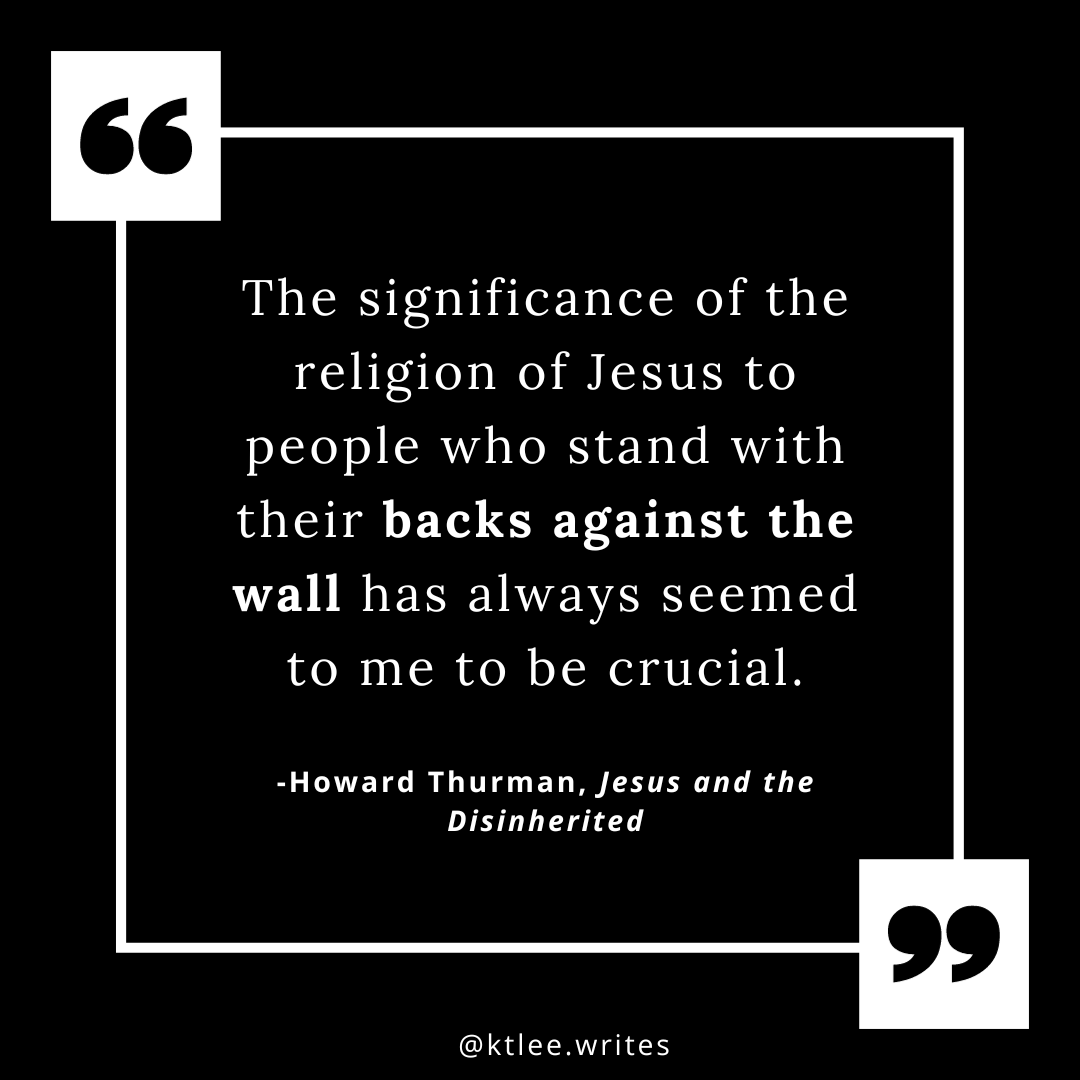
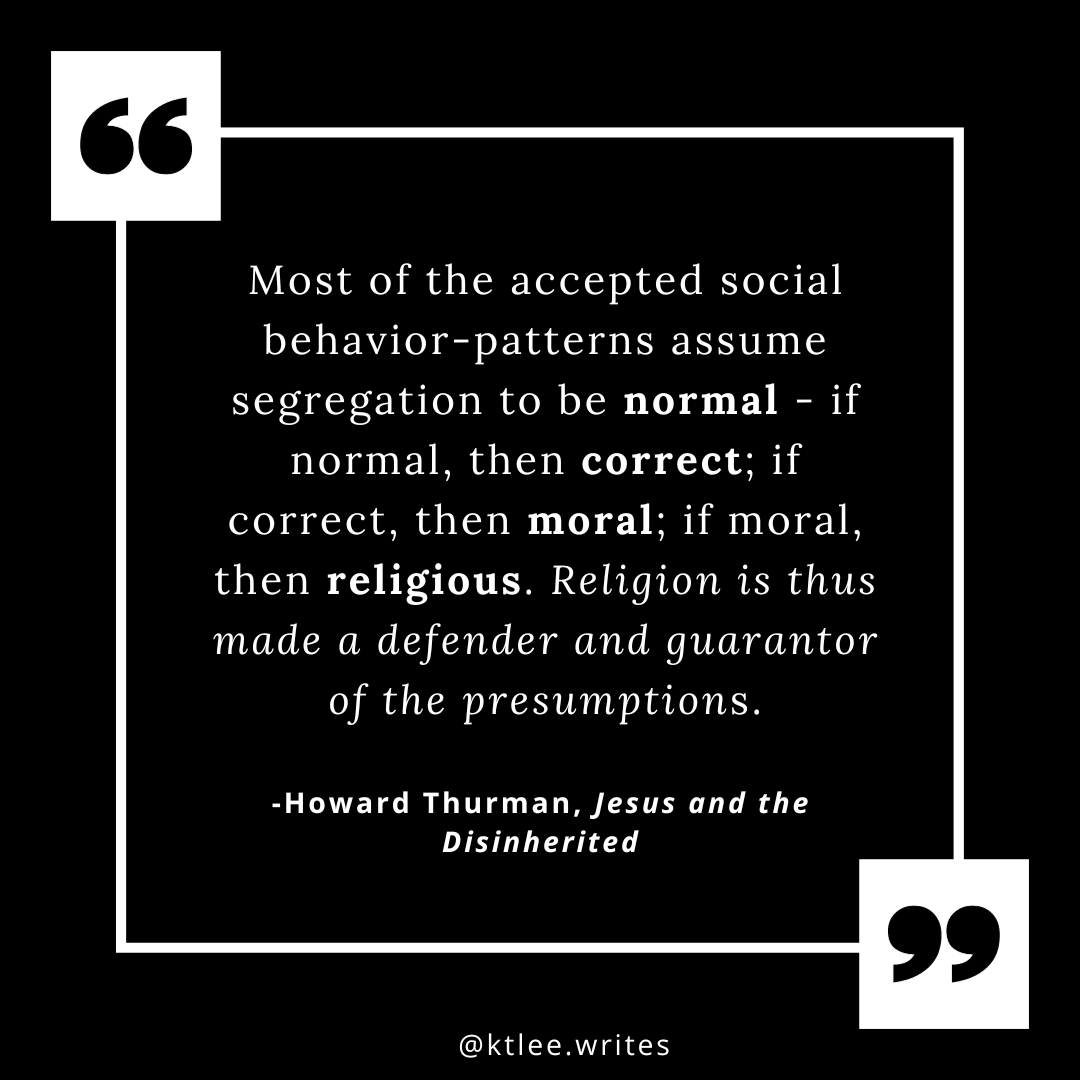
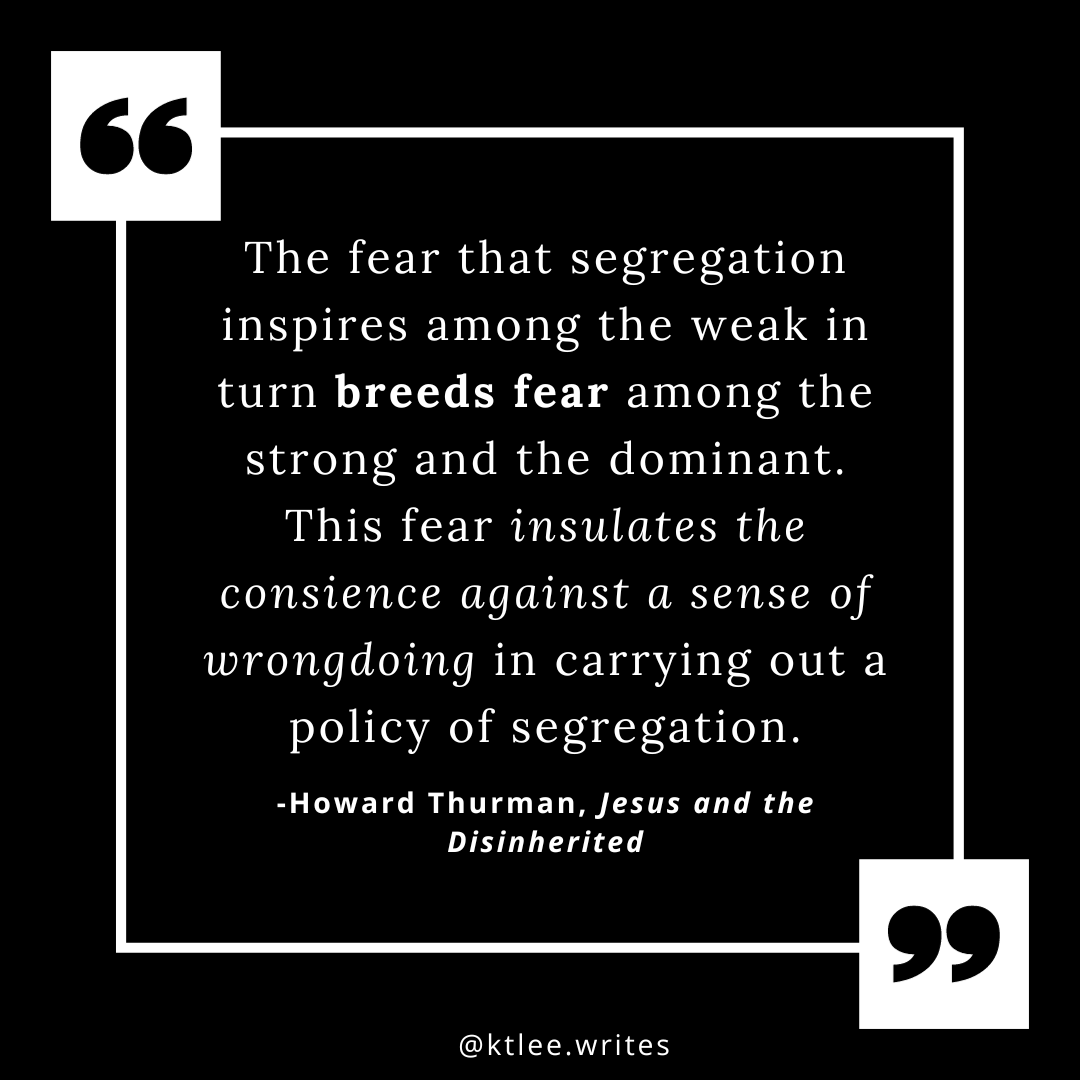

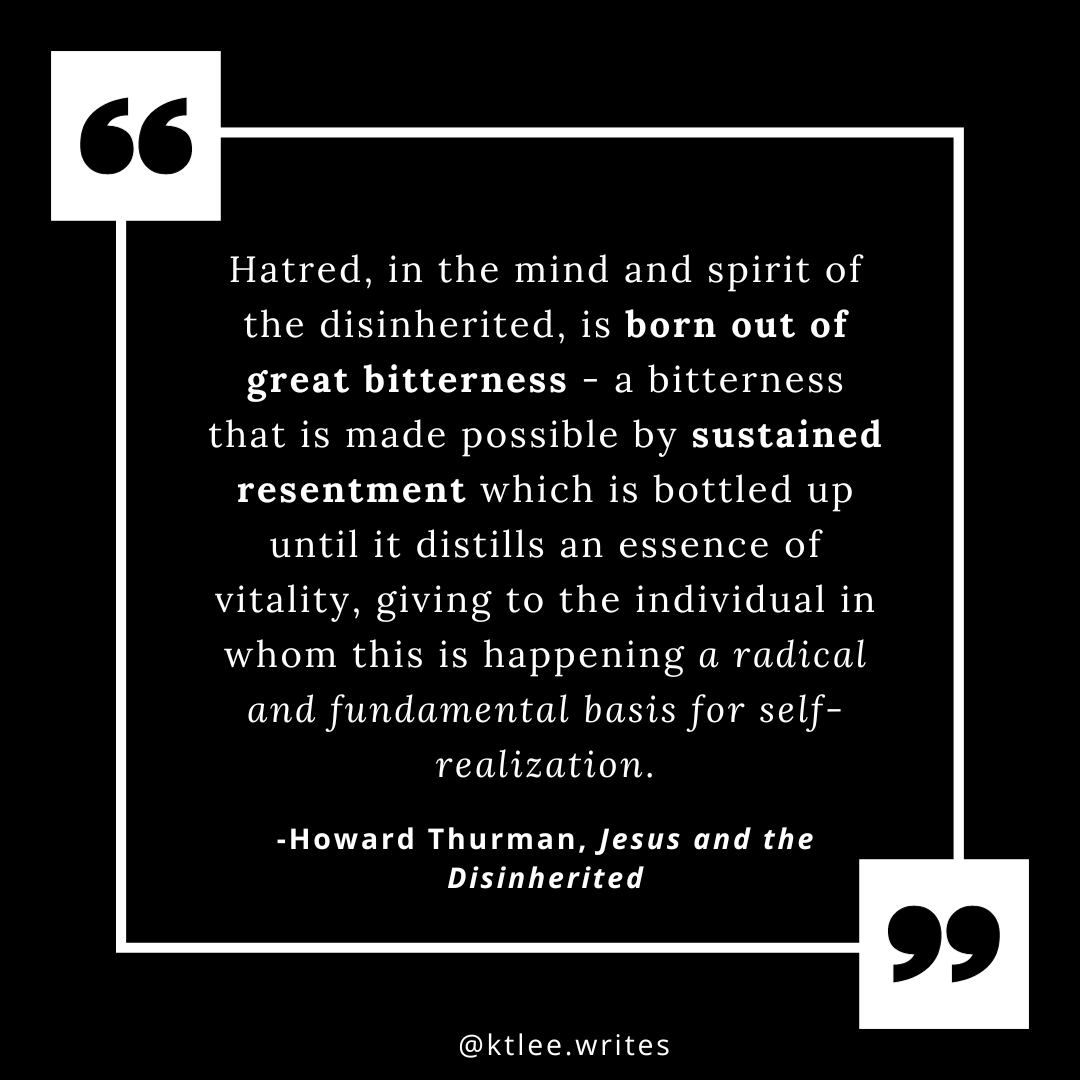
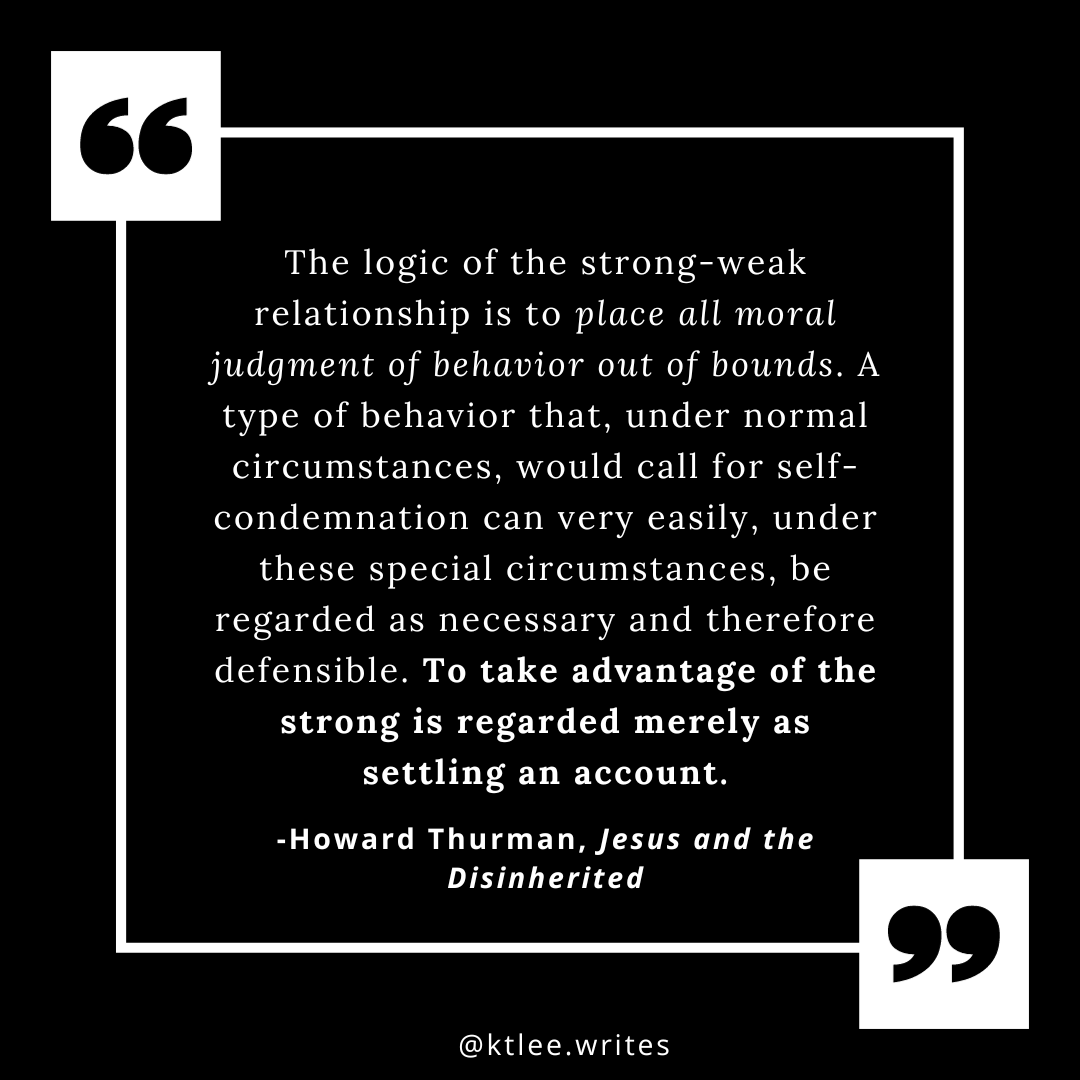
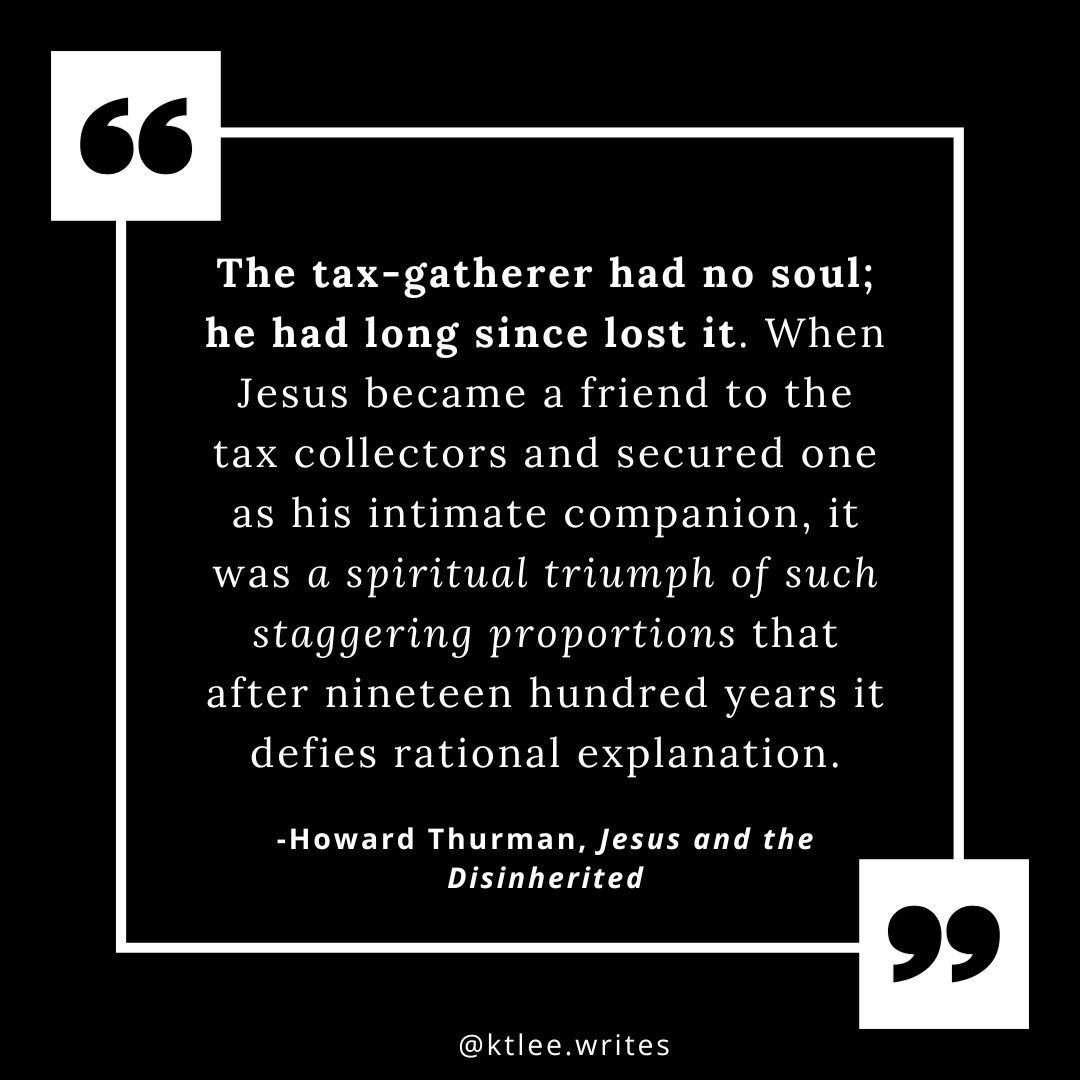
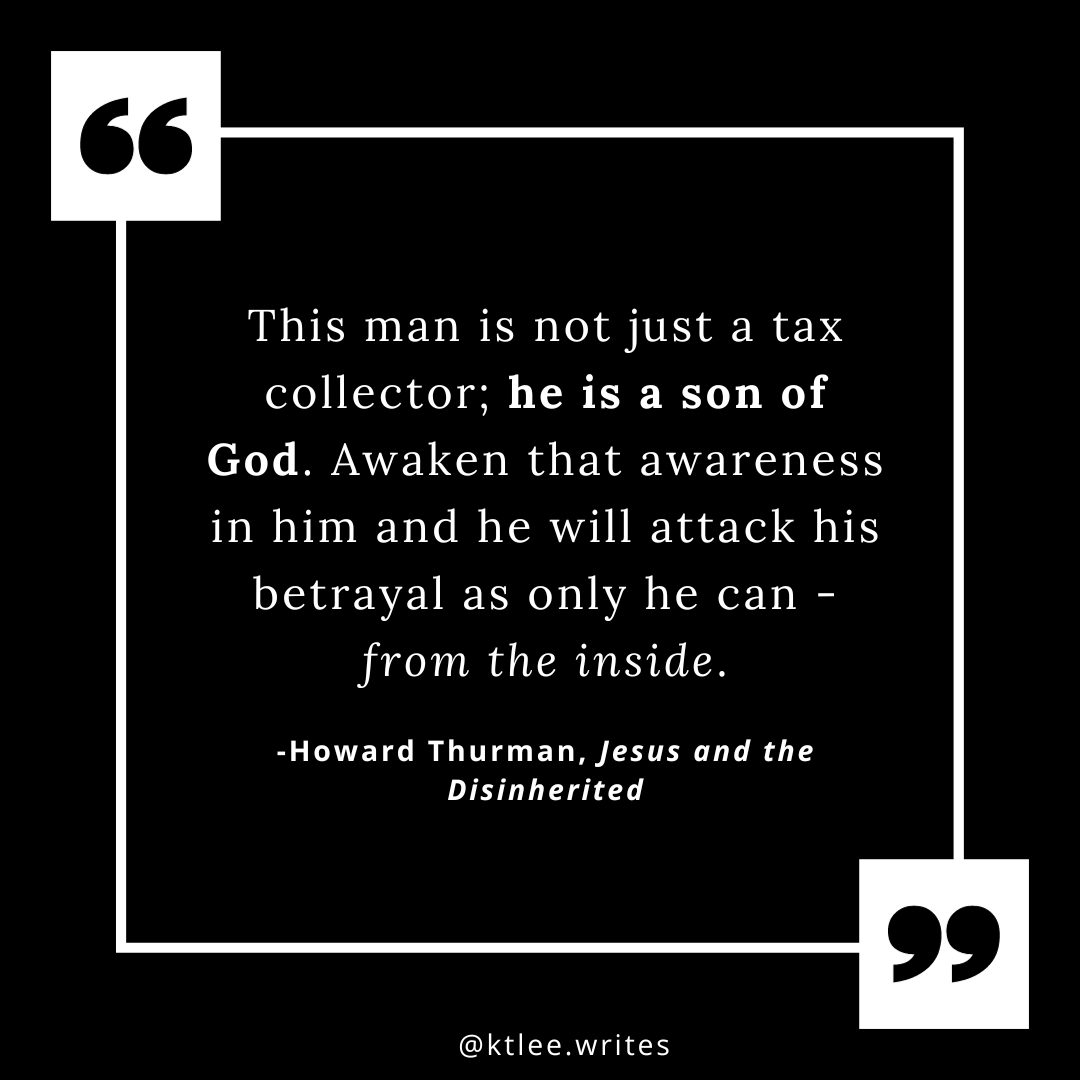

"To awaken the tax collector (or any oppressor) to their identity as a child of God, we have to first ourselves recognize them as such"
some profound thoughts here. I have yet to read this book, but it sounds so necessary and awakening. honestly, forgiving one's oppressor is horribly, unbelievably hard. i've had to come to terms with this too. when we meet next time, i can tell you more about it!